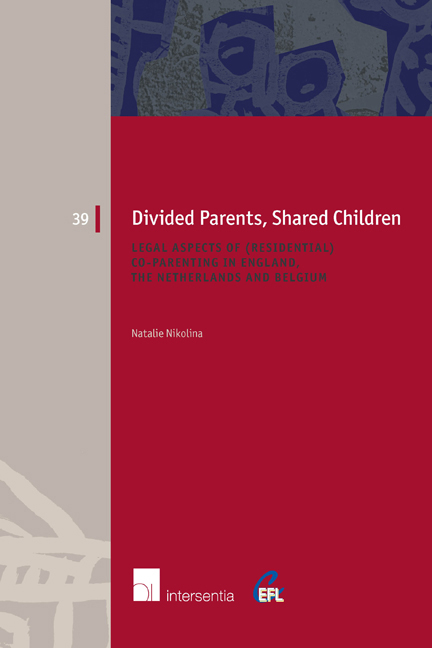 Divided Parents, Shared Children
Divided Parents, Shared Children Book contents
- Frontmatter
- Acknowledgements
- Contents
- Chapter 1 Introduction
- Chapter 2 International and European framework
- Chapter 3 The English legal system
- Chapter 4 The Dutch legal system
- Chapter 5 The Belgian legal system
- Chapter 6 Socio-psychological aspects of residential co-parenting
- Chapter 7 Comparative synthesis
- Chapter 8 Conclusions and recommendations
- References
- Samenvatting
- About the author
- European Family Law Series
Chapter 2 - International and European framework
Published online by Cambridge University Press: 12 December 2017
- Frontmatter
- Acknowledgements
- Contents
- Chapter 1 Introduction
- Chapter 2 International and European framework
- Chapter 3 The English legal system
- Chapter 4 The Dutch legal system
- Chapter 5 The Belgian legal system
- Chapter 6 Socio-psychological aspects of residential co-parenting
- Chapter 7 Comparative synthesis
- Chapter 8 Conclusions and recommendations
- References
- Samenvatting
- About the author
- European Family Law Series
Summary
INTRODUCTION
While the main focus of this book is national legislation on (residential) co-parenting, it is imperative to place such legislation within a certain context. National legislation does not operate in a vacuum; it is influenced by politics, demographic changes, behavioural changes and, within the legal sphere, supranational legislation.
In view of the growing influence of international and regional organizations, such as the European Union, and their instruments on national law, these organizations and their instruments cannot be disregarded in legal research. International and regional instruments have now become an integral part of the national systems to which they apply. Therefore, before looking at how the national systems function, which flaws they contain, or how they can be changed, it is prudent to first examine the international framework in which they have to function. This chapter is devoted to this. In order to answer the question of whether international legal instruments support (residential) co-parenting after parental separation, it analyses the international framework for coparenthood.
This chapter includes only a discussion of those international and regional instruments that are relevant to the topic of residential coparenting, or the broader concept of parental responsibilities. These include issues such as the allocation and exercise of parental responsibilities, the child's rights in proceedings dealing with his or her residence, the child's rights in proceedings concerning the care of or contact with the child, and the provisions concerning the child's residence after parental separation. If they add something to the main subject, other closely linked issues are also briefly considered. While related to issues of (residential) co-parenthood, instruments on child abduction or relocation have deliberately been excluded from this chapter and the subject-matter is only briefly and summarily included within (the rest of) this book.
Because there is no clear division between residence and contact, especially within international literature, and extensive contact can in practice mean that the child lives for a substantial amount of time with the non-resident parent, when an instrument has no provisions on residence, but does include provisions on contact that can be relevant for residential co-parenting, these provisions are included in this chapter.
- Type
- Chapter
- Information
- Divided Parents, Shared ChildrenLegal Aspects of (Residential) Co-Parenting in England, the Netherlands and Belgium, pp. 9 - 44Publisher: IntersentiaPrint publication year: 2015


